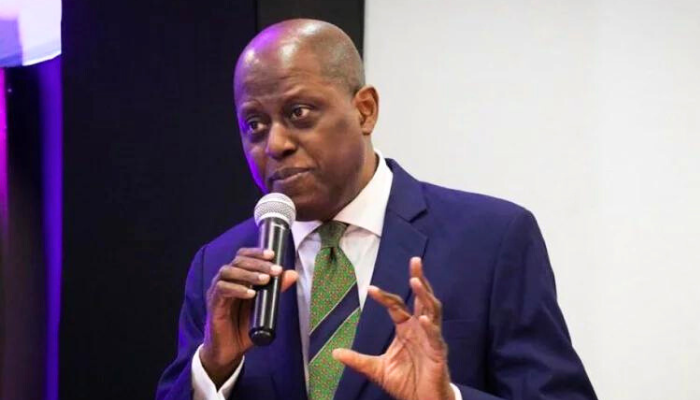Naira’s tragic descent: What is the way forward?
In recent times, the Nigerian naira has experienced a profound and troubling decline, leaving citizens and economists grappling with the consequences of its tragic fall. This alarming descent has sparked concerns about the nation’s economic stability, prompting a closer examination of the factors contributing to the depreciation of the currency. The significant variance in exchange […]

Olayemi Cardoso, CBN Governor
In recent times, the Nigerian naira has experienced a profound and troubling decline, leaving citizens and economists grappling with the consequences of its tragic fall. This alarming descent has sparked concerns about the nation’s economic stability, prompting a closer examination of the factors contributing to the depreciation of the currency.
The significant variance in exchange rates raises concerns about transparency, market stability, and the effectiveness of monetary policies. Addressing these disparities is crucial for fostering a more reliable and consistent foreign exchange environment that can contribute to overall economic stability.
In June 2023, the Central Bank of Nigeria (CBN), implementing the directive of Tinubu, initiated the unification of the naira rates, signalling the end of its control of the forex market. Since then, the exchange rate of the currency has been determined by market forces. Because the policy is not based on sound economics, the slide of the naira accelerated.
Five months ago, the dollar first crossed N1,000 in the parallel market. Despite receiving a $2.25 billion support from AfreximBank and the claim that the CBN had improved the clearing of forex obligations aimed at bolstering the market, the depreciation of the naira continues to worsen.
- Tinubu congratulates Dangote on Senegal’s National Order of the Lion award
- NAIDA inaugurates team to curb corruption in agric input distribution
As of May 2023, the official naira to dollar rate averaged N460.70 compared to the N460.42 the previous month. The unofficial market rate was an average of N760. With the present figures, it is clear that the unification of the naira rates is a mere artificial policy. The fundamentals that should support the floatation of the currency are lacking.
The Economist Intelligence Unit, an arm of The Economist of London, projected last July that there would be a “return to heavier exchange-rate management from the second half of 2023,” adding that “the CBN lacks experience in conducting monetary policy under a float, and the need to control rapidly increasing inflation will become more acute over time.” This is proving to be true, despite the recent statements to the contrary by Yemi Cardoso, the CBN Governor.
Consultants, KPMG International Limited, projected that the forex rate in the country would range between N650/$1 to N750/$1 following the floatation of the currency in June 2023 though, current realities have surpassed their projection.
At the time of prognosis, it highlighted the need for proper decentralisation of the forex supply environment with the CBN still acting as the primary supplier of forex.
The Nigerian National Petroleum Company Limited, the major forex earner, is also heavily funding the importation of petroleum products into Nigeria. Despite paying $61 million to international airlines, government is not liquid enough to clear the balance of over $700 million. Other pressure areas are international tuition and medical tourism.
Nigeria, often hailed as an economic powerhouse in Africa, now faces the harsh reality of a weakened currency. The naira’s tragic fall is intertwined with a complex web of economic challenges, ranging from external pressures to internal missteps. In order to fully grasp the magnitude of this crisis, it is essential to delve into the key contributing factors.
One major factor driving the naira’s decline is external economic pressures. Global events, such as fluctuating oil prices and geopolitical uncertainties, have had a direct impact on Nigeria, which heavily relies on oil exports for revenue. As the largest oil producer in Africa, Nigeria’s economy is particularly vulnerable to the volatile nature of the international oil market.
Persistent trade imbalances have also played a significant role in the naira’s depreciation. The gap between Nigeria’s imports and exports has widened, leading to increased demand for foreign currencies and putting additional strain on the naira. Addressing trade imbalances becomes imperative for stabilizing the currency and fostering economic resilience.
Domestic economic policies have come under scrutiny as well. Inconsistent monetary policies, lack of fiscal discipline, and delays in implementing reforms have contributed to the naira’s tragic fall. Policymakers must prioritize effective measures to restore confidence in the currency and create an environment conducive to economic growth.
The naira’s tragic fall serves as a stark reminder of the challenges faced by Nigeria’s economy. While external pressures undoubtedly contribute to the crisis, addressing internal issues, implementing effective policies, and fostering economic diversification are essential for rebuilding confidence in the currency.
As Nigeria navigates these challenging times, a concerted effort from both policymakers and citizens is needed to pave the way for a sustainable and resilient economic future!
Kabir Fagge Ali is a youth corps member with PRNigeria Centre [email protected]
